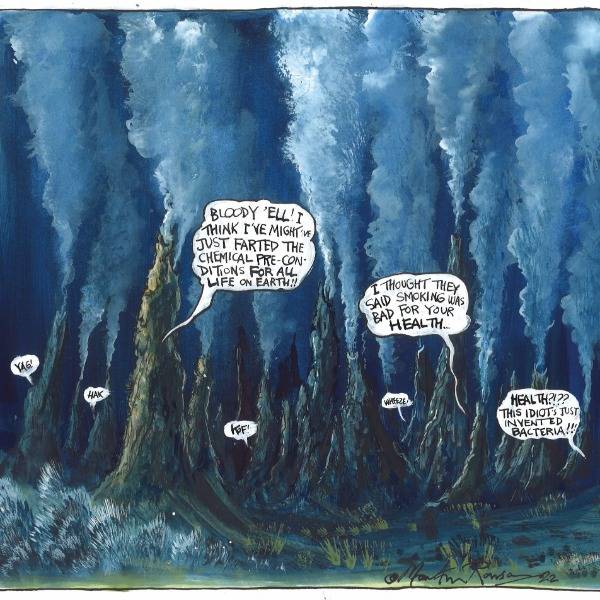It is odd that our understanding of Astronomy, perhaps the oldest subject in the world, should have advanced so quickly in the past century. This rapid development of the scientific world-view has had a curious effect on some people. These people have apparently concluded that the world is too complicated for rational explanation and have consequently taken refuge in quaintly (some would say dangerously) irrational ideas.
I am referring to the resurgence of, for example, creationism in seemingly respectable quarters. Steven Layfield, Head of Science at Emmanuel City Technology College in Gateshead in his notorious lecture of 21 September, 2000, aligned himself firmly with what Richard Dawkins (Daily Telegraph, 18 March 2002) termed the 'Young Earth Creationists' those creationists who prefer to believe that the Earth is a mere few thousand years old. I should not have been as dismissive of their views in my recent review of Aeons (New Humanist, Autumn 2001) had I believed at the time of writing that such people as Layfield actually existed, let alone as science teachers. Dawkins' excellent Telegraph article should be compulsory reading for every science teacher maybe for everyone who wants to know about the sheer imbecility of what is going on in at least one school.
Incidentally, the owners of the site http://www.christian.org.uk, the Christian Institute, Newcastle-upon-Tyne have blocked access to the original web text of the Layfield lecture. It is pointless to speculate why.
However, New Humanist readers can still access the other lectures in the series http://www.christian.org.uk/html-publications/lectures.html where they will (if they are quick) find The Teaching of History (A Biblical Perspective) a lecture given (you've guessed) at Emmanuel College, Gateshead, on Thursday 17 May 2001 by Miss Gwyneth Evans, Head of History at Castle View Comprehensive School in Sunderland.
Miss Evans says, for example: In pursuing knowledge fallen man tries to relegate God, denying his existence and regarding God's overarching plan as totally irrelevant and even preposterous. Man sees himself as God and the source of history. The Christian historian ought to examine evidence critically and reach his judgement based on Biblical absolutes.
In practice how does a Christian historian differ in approach from an unbeliever?
The historian who sees man as the source of history will always look for the causes of events. His modus operandi is to trace cause and effect.
The Christian historian on the other hand knows that ultimately God is the cause of all events.
Imagine letting your children be taught history by someone who believed in 'Biblical absolutes'.
All the more timely is the appearance of this splendid new book by Professor Peter Coles. Professor Coles has achieved the near-impossible. He has written an entertaining, even charming, introduction to cosmology. The book forms part of a series of "Very Short Introductions" to various subjects ranging from Socrates to sociology, published by OUP.
There are ample well-chosen illustrations and exactly the right number of complicated mathematical equations none. Coles leads the reader painlessly through a veritable minefield of complexity from Babylon to brains.
One advantage of the brevity of the book is that the most significant points tend to stand out more clearly than in a longer treatment. For example, the sheer magnificence of Einstein's achievements has never been made clearer than in Chapter 2 ('Einstein and all that').
I particularly liked the informal style, even if this does tend to make the material seem easier than it really is. Here is an example from page 106 at the end of Chapter 7:
The picture emerging from structure studies seems to be in line with the other strands I have discussed, but we still don't know how the Universe contrived to be the way it is. The answer to this deeper puzzle will rely on deeper understandings of the nature of matter, space, and time. I'll discuss these in the next chapter.
By using the first person throughout the book and keeping the emphasis on what we don't know as well as what we do know, Coles manages to convey a suitable humility in the face of the vastness of the subject. Maintaining a clear distinction between conjecture and certainty is especially important in such a conceptually difficult subject.
Buy and read this book even if you never thought you were interested in cosmology. It is a masterpiece of lucidity.

